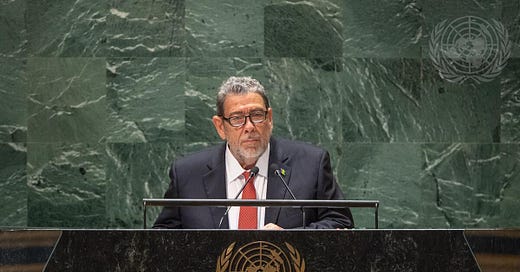I first became aware of Comrade Ralph at an event in 2020 in Havana, where he delivered a memorable address in his capacity as Prime Minister of Saint Vincent and the Grenadines, in which he maintained that the fundamental conflict of our time is between imperialism and anti-imperialism. Now Comrade Ralph arrives to the 78th Session of the UN General Assembly, held from September 19 to September 26, 2023, to declare that the imperialists are putting forth a false frame, in which they present themselves as defenders of democracy, while they characterize as autocracies those governments that adopt anti-imperialist policies in defense of their sovereignty.
Saint Vincent and the Grenadines is a small Caribbean island nation, with a territory of 142 square miles and a population of 104,332. Its territory includes the main island of Saint Vincent and two-thirds of the northern part of the Grenadines, a chain of t…



